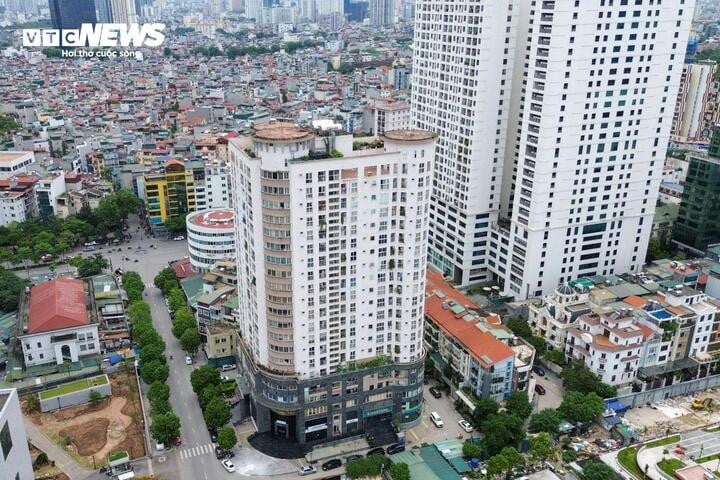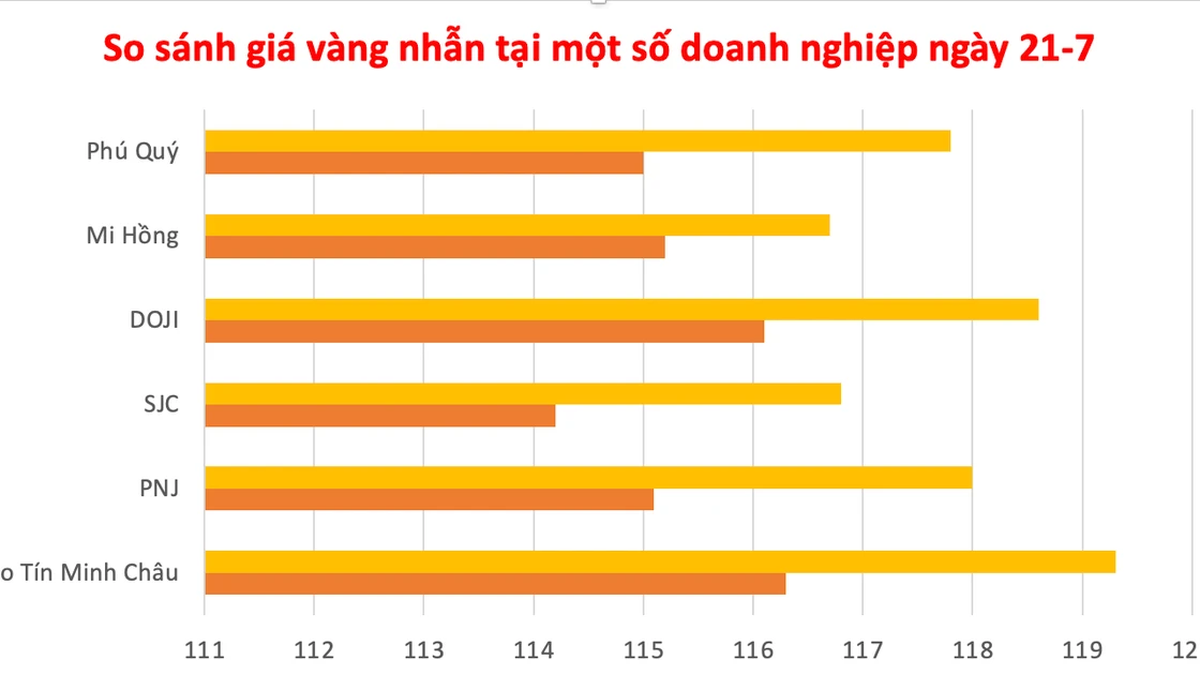Double-edged sword
Mr. Tran Ngoc Thien (Hoang Mai ward, Hanoi ) said: In mid-2022, when seeing that house prices started to increase sharply, he and his wife decided to buy a 75 m² apartment in Vinh Tuy ward for 3.35 billion VND. " If I didn't decide to buy it right away, I was afraid that house prices would continue to increase, " he explained why he paid right in the middle of the "storm".
But at that time, because he only had about 800 million VND, he agreed to borrow the remaining amount from the bank with a preferential interest rate of 0% for the first 2 years. According to the agreement, Mr. Thien had to pay 25% of the apartment value in advance, equivalent to about 850 million VND, and borrow the remaining 2.5 billion VND from the bank for a period of 30 years.
The first two years, thanks to the interest-free loan, monthly payments were smooth sailing. However, things started to change from mid-2024.
When entering the real interest payment period, the floating interest rate skyrocketed to 12%/year, pushing the principal and interest to be paid monthly to more than 30 million VND, at this time Mr. Thien was really shocked. After struggling for a few months, the cost of living became more and more stressful, leading to 6 consecutive months of not being able to pay the debt.
Immediately, the loan was moved to the bad debt group and the bank sent a notice requesting the handover of assets for liquidation procedures. Mr. Thien was worried and could not sleep well because of the risk of great losses.
Fortunately, thanks to the support of relatives and friends, Mr. Thien was able to pay off all the overdue debt and pay in advance the interest and principal for the next three months to prove that the cash flow had returned. Thanks to that, the loan returned to group 1, avoiding the risk of losing the house.

According to Mr. Thien, in early 2025, the interest rate will return to 9%, but his monthly interest and principal payment will still be about 22 - 23 million VND.
" Although the interest rate has decreased, the amount of more than 20 million VND/month is still a big burden because my wife's job is currently facing difficulties, her income has decreased, so our monthly salary is almost only used to pay off the bank loan. We have to borrow from relatives to cover living expenses and other expenses ," Mr. Thien confided.
Not as lucky as Mr. Thien, Ms. Nguyen Huong Lan (Tu Liem ward, Hanoi) said that she has just decided to sell the apartment she bought 2 years ago to pay the bank because she cannot afford to pay the principal and interest every month.
Ms. Lan shared that she bought a 65 m² apartment for more than 3 billion VND. She had 1 billion VND and borrowed more than 2 billion VND from the bank. She bought according to the progress and received 0% interest support until she received the house. When she received the house, in the first year, she had to pay both principal and interest of more than 20 million VND/month. At that time, she and her husband decided to tighten their spending to try to save enough money to pay the bank.
However, since the end of 2024, Ms. Lan's husband lost his job, and the whole family has been relying on her salary of 18 million VND. " With my income, even if I fast and spend less, it is not enough to pay the bank interest ," Ms. Lan said.
Finally, after many sleepless nights, Ms. Lan discussed with her husband about selling their current house to pay off the bank loan, saving the remaining money, and then the couple went back to renting a house.
" Even though I have to rent a house, I no longer have the pressure of paying off bank loans. The monthly bank interest is enough for my family to rent an old apartment to live in, " Lan shared.
How to avoid the debt spiral
According to Dr. Nguyen Tri Hieu - a banking and finance expert, financial leverage is an important tool to help people access housing, but if not used properly, it can become a debt spiral.
Mr. Hieu recommends that home buyers should only borrow up to 80% of the property value, while ensuring that monthly debt payments do not exceed 50% of net income. More importantly, they should have a reserve fund that can cover 6-12 months of debt to avoid risks in case of unemployment or loss of income.
In addition, Mr. Hieu recommends that young people carefully calculate their ability to repay the loan before deciding to borrow, avoiding the FOMO (fear of missing out) mentality that can easily lead to the trap of borrowing beyond their means. Creating a table of income and expenses and testing scenarios of income and interest rate fluctuations are essential to assess the safety of the loan.

" Financial leverage is a double-edged sword. If not well controlled, borrowers can easily get into debt, even having to sell their house when the market goes down or income is unstable ," Mr. Hieu analyzed.
Mr. Vu Cuong Quyet, General Director of Dat Xanh Mien Bac, also said that home buyers when borrowing from banks must balance their income after the preferential interest rate period. After that period, the interest rate will have to add a margin of 2-3% or more, depending on the bank.
According to Mr. Quyet, interest rates according to the market mechanism, sometimes unpredictable in the next 2-3 years, can go up to over 10%, very risky. Therefore, before borrowing, it is necessary to carefully calculate income, ability to pay after 2-3 years, to avoid family budget deficit.
Many forecasts suggest that as credit demand increases, deposit and lending interest rates are likely to increase next year. Therefore, lending interest rates may increase to 11-12% per year in the following years.
In addition to interest rates, contract terms also need to be carefully studied. Not reading the contract carefully can lead to hidden fees such as early repayment fees or conditions for adjusting the interest rate after the promotion.
" To avoid mistakes, home buyers must carefully consider their ability to repay the loan and have a contingency plan for events such as job loss, illness, etc., " Mr. Quyet advised.
Mr. Tran Minh Nhat - a long-time investor in Hanoi also shared that recently, many banks are launching attractive policies to attract customers. Some banks offer extremely "soft" loan interest rates of about 6-7%, however, this interest rate is only applied for 3-6 months.
After the preferential period ends, the interest rate will be floating at the base interest rate plus a margin of 3.5%/year. Notably, most banks are applying the base interest rate to replace the 12-month term deposit interest rate as the basis for adding the margin, thereby determining the final loan interest rate that customers must pay.
The final result, with an average base interest rate of 8.2 - 9%/year, plus the margin, home loan interest rates are still hovering around a sky-high 12.5 - 13%/year (after floating). Not to mention, some banks also charge additional "surcharges" such as insurance, maturity costs... adding up to about 2-3%/year.
Mr. Nhat said that among investors like him, there have been many home buyers who have been burdened by debt after the preferential period expired. In many cases, after the floating interest rate increased to 13-14%, the burden was too great, and they had to sell off assets to pay off debt.
Source: https://baolangson.vn/ganh-gia-nha-lien-tuc-tang-cao-nhieu-nguoi-roi-vao-vong-xoay-no-ngan-hang-5053725.html



























![[Photo] National Assembly Chairman Tran Thanh Man visits Vietnamese Heroic Mother Ta Thi Tran](https://vphoto.vietnam.vn/thumb/1200x675/vietnam/resource/IMAGE/2025/7/20/765c0bd057dd44ad83ab89fe0255b783)






































































Comment (0)